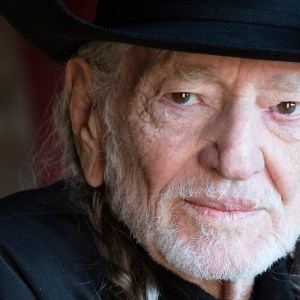Bruce Springsteen‘s Nebraska is, to put it mildly, bleak. There’s murder, destruction, and unease, thrust against a simple backdrop of acoustic guitar and home-recorded vocals. For a songwriter who’d always tempered the light and the dark so well on previous records, Nebraska found Springsteen committing himself to one vibe: a sort of monochromatic melancholy that was stark, solemn, and even startling.
Videos by American Songwriter
Of course, that darkness is one of the reasons Nebraska remains so compelling. It’s the outlier in a catalog that often veers toward the anthemic, and its tales of desperation, economic hardship, and criminal behavior still a pack a punch today, more than 40 years after their release. We’ve ranked the album’s 10 tracks below.
10. “My Father’s House“
“My Father’s House” was an unexpected highlight of Springsteen on Broadway, where it was used to illustrate the strained relationship between Springsteen and his domineering dad, Douglas Springsteen. Even so, the song doesn’t sound quite as riveting or wounded on Nebraska.
9. “Open All Night”
With a guitar pattern modeled after Chuck Berry, this is the closest Nebraska comes to rock ‘n’ roll. “Open All Night” sounds great in the context of Nebraska, offering energy (and literal electricity, thanks to the presence of Springsteen’s electric guitar) on an album rooted in downcast folk music. On its own, though, the song doesn’t quite measure up to the rockers that fill the Boss’ remaining records.
8. “Used Cars“
Somewhere in the Columbia Records archives, there’s surely a piece of paper that contractually obligates Bruce Springsteen to include at least one song about a car on each album. That’s a joke, of course, but “Used Cars” is no laughing matter, delivered by a young protagonist who’s embarrassed by his family’s previously-owned vehicle. My dad, he sweats the same job from morning to morning, he laments, only to have his internal monologue interrupted by the sound of the car horn. Like “Mansion on the Hill,” which also appears on this list, “Used Cars” offers a quick peek at the gap between economic classes.
[RELATED: 10 Iconic Moments From Bruce Springsteen’s Career]
7. “Nebraska“
During the first line of “Nebraska,” Charles Starkweather meets Caril Ann Fugate. By the end of the second line, the real-life-killer couple have already murdered 10 people. That’s one hell of a narrative jump, but for a song that’s delivered from Starkweather’s perspective, it’s right on the money. Starkweather never did show remorse for the murders he committed during the late 1950s, and the final line in Springsteen’s song—I guess there’s just a meanness in this world—sums up the nihilism of one of America’s most notorious killers. Springsteen’s steady, unflinching delivery makes the song all the more chilling.
6. “Reason to Believe“
Although it opens with the arresting image of a dead dog laying beside a highway, “Reason to Believe” still offers the only shred of optimism to be found on Nebraska. At the end of every hard-earned day / People find some reason to be believe, Springsteen says, offering several examples—including a groom abandoned at the altar and a funeral ceremony for an infant—to prove his point. The song is far from a pick-me-up, but if you’ve come to Nebraska looking for resilience, here it is.
5. “Johnny 99“
After losing his job and his mortgage, Johnny gets drunk, grabs a gun, and stupidly kills a night clerk. He’s inarguably guilty of murder—not only in the eyes of God, but also in the courtroom of Judge John Brown, who slaps Johnny with a 99-year sentence—but it’s hard not to feel sympathy for the man when he requests to be executed instead. Springsteen brings out the humanity in Johnny’s character, which makes “Johnny 99” one of the album’s most enduring tracks.
4. “Mansion on the Hill“
“Mansion on the Hill” measures the distance between the haves and the have-nots. The song’s audience is never given a peek indoors; instead, we see the mansion from the outside, looming above its blue-collar town like some sort of unattainable status symbol. On an album that deals with petty criminals, serial killers, and wannabe Mafia men, “Mansion on the Hill” finds a new way to explore the challenges of the American working class without resorting to violence.
3. “State Trooper“
Springsteen’s shuffling guitar pattern is every bit as hypnotic as the dotted white lines that run along the Jersey turnpike, where “State Trooper” takes place. The spell isn’t broken as much as punctuated by the hoots, howls, and yelps that Springsteen lets loose during the final verse, as though the song’s slow-simmering tension has finally gotten the best of him.
2. “Atlantic City“
Nebraska‘s best-known song tells the tale of a desperate man who, in a last-ditch effort to alleviate some debts, heads to the Jersey Shore to do favors for the mob. He’s doomed, of course, and his inevitable fate fills the track with a bruised sort of beauty. Four months after Springsteen tracked “Atlantic City” at home, the E Street Band spent three days working up an electrified version that couldn’t quite match the ragged power of the original. Even a well-received cover by The Band in 1993 failed to rival Nebraska‘s rendering.
1. “Highway Patrolman”
“Highway Patrolman” is so cinematic that Sean Penn made a full-length film about the two Roberts siblings, who find themselves on opposite ends of the law in Northern Michigan. In the final verse, policeman Joe willingly lets his sibling, Frankie, escape across the Canadian border after killing a man back in town. Nebraska‘s narrators tend to be criminals, but “Highway Patrolman” is delivered from a lawman’s perspective, lending extra gravitas to a song that weighs one’s duty to his job against his duty to family.
Photo by Hulton Archive/Getty Images

Atlantic City not No. 1?? C’mon, now…